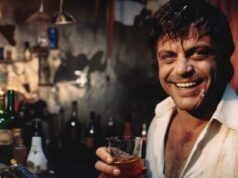Before an unfortunate psychoanalytic incident, Eugene O’Neill, commonly considered America’s preeminent playwright, was also an eminent drunk.
His condition was both hereditary and environmental. Eugene’s father, the famous stage actor James O’Neill, was an inspiration to all functional alcoholics, consuming “a daily quart without showing it” and boasting that “whiskey never caused him to miss a performance,” according to O’Neill – Life with Monte Cristo by Arthur and Barbara Gelb.
The sons, Eugene and older brother Jamie, were especially supportive of their father’s daily regimen. From a young age, they were putting water in whiskey bottles which they had gleefully depleted. Eventually, the father placed his spirits under lock and key. This precaution did not spell the end of the party. “[Father] always came through handsomely,” Eugene recalled. “He’d ask us a few questions we couldn’t answer, and then assure us of our general unworthiness and invariably end by saying, ‘Well, I suppose you want a drink.’”
Father would not be Eugene’s sole benefactor. By the time he was in his mid-teens, his older brother was basically force-feeding him booze and hookers; the latter Eugene consumed because of fraternal pressure, the former because he damn well liked it.
Not long after entering Princeton University, a frequently-inebriated Eugene was expelled for chucking a bottle through a window belonging to the school president. Interestingly, the school president was future U.S. President Woodrow Wilson, who later helped institute the 9 to 5 workday – something to which the restless, melancholy Eugene was not well suited.
He was, however, functional enough to impregnate a girl named Kathleen. Coerced into marriage, the impending father soon skipped town, fleeing to Honduras with a gold-prospecting team. No precious metals were found; however, he did contract malaria, before hopping a ship to Buenos Aires as an “able-bodied seaman.”
Eugene’s slight build was not very conducive to combating malaria or the rigors of sailing, and he self-medicated with booze in effort to escape his chronic physical discomfort. Upon arriving at the Argentine seaport, he knocked around a bit – drifting through town, sleeping on benches, befriending other derelicts, drinking rum, getting banished from discount brothels – before finally being placed on a New York-bound ship.
Back in the Big Apple, he was still a derelict who, when unable to afford a five-cent whiskey, opted for bargain-basement wood alcohol. At a Manhattan dive bar and dubious residence called Jimmy the Priest’s, Eugene – having stayed sober long enough to realize how lousy his situation was – attempted suicide by swallowing a copious amount of Veronal tablets. Discovered about 24 hours later in a semi-paralytic state, he was whisked off to the hospital.
As it turned out, the troubled Eugene had a lot of life left: one Noble Prize, three Pulitzers, three marriages, an affair with the wife of a prominent Communist muckraker, and a daughter whom he disowned when she married Charlie Chaplin. Also, there were plenty more opportunities to get loaded.
Eugene O’Neill’s Last Plays by Doris Alexander draws an important distinction between the adult drinking habits of Eugene and his brother: “Jamie was a continual alcoholic; Eugene was a periodical alcoholic.” In the 1920s, Jamie began to indulge in such hazardous Prohibition whiskey that he blinded himself and was confined to a sanatorium in Patterson, NJ.
Eugene proceeded with his routine of sobering up enough to compose his plays, then going on research-intensive benders at various Greenwich Village bars. Such a pattern could have, and should have, gone on permanently. But the drinking career of this thriving boozer hit a nasty snag at age 37, when he saw a psychiatrist who told him that he drank “to bury oedipal problems.” So freaked out by the shrink’s analysis, poor Eugene promptly gave up booze…forever.
Now one might be tempted to dismiss him as a traitor. But keep in mind that, before this sexually-panicked Judas forsook his Irish nectar, he was a gorgeous specimen of a drunk.
As often happens when writers give up the sauce, Eugene’s apostasy coincided with a dramatic decline in literary production. Abetted by a form of Parkinson’s, which ravaged his body to the point where he could no longer hold the pen, he wrote only two dramas during his last two decades.
There was, however, some ultimate redemption in Eugene’s death (at age 65), which occurred on the 4th Floor of Boston’s old Kenmore Square Hotel Sheraton – these days a dormitory called Shelton House, belonging to the overpriced bar known as Boston University. The new occupants know what’s good for them: yes to drinks, no to shrinks.










